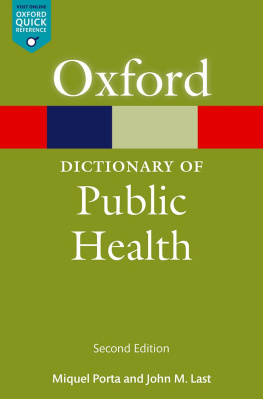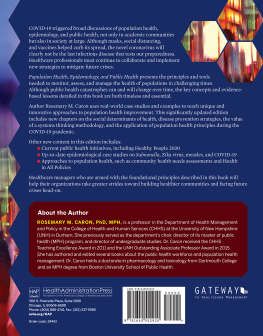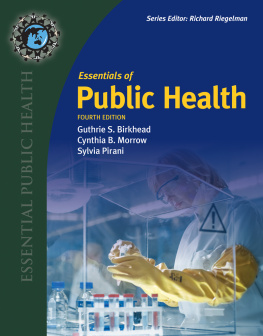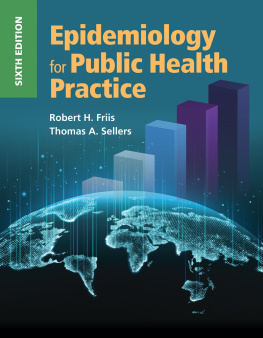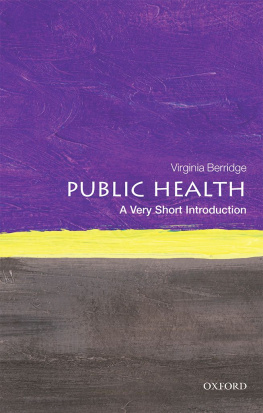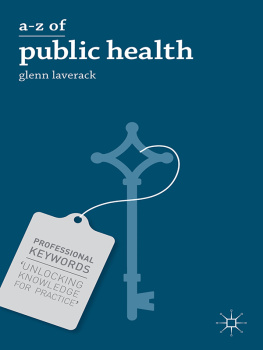While most e-readers can display special characters (such as and ), many cannot search for words containing them, unless the special characters themselves are typed into the search box. If you are unable to type these characters, please browse for your term using the .
Oxford University Press is a department of the University of Oxford. It furthers the Universitys objective of excellence in research, scholarship, and education by publishing worldwide. Oxford is a registered trade mark of Oxford University Press in the UK and in certain other countries
All rights reserved. No part of this publication may be reproduced, stored in a retrieval system, or transmitted, in any form or by any means, without the prior permission in writing of Oxford University Press, or as expressly permitted by law, by licence or under terms agreed with the appropriate reprographics rights organization. Enquiries concerning reproduction outside the scope of theabove should be sent to the Rights Department, Oxford University Press, at the address above
Public health is the art and science of promoting and protecting good health, preventing disease, disability, and premature death, restoring health when it is impaired, and maximizing the quality of life when health cannot be restored. Public health requires collective action by society; collaborative teamwork involving physicians, nurses, engineers, environmental scientists, health educators, social workers, nutritionists, administrators, and other specialized professional and technical workers; and an effective partnership with all levels of government. The horizons are far-flung, the boundaries are ill-defined, the interfaces with other institutions of society and with other disciplines and professions are numerous.
Many aspects of public health have specialized vocabularies. Communicable disease control, epidemiology, genetics, nutrition, toxicology, social work, sanitation and public health engineering, environmental sciences, administration, and other specialized fields all have their own languages. It is necessary for all public health workers to understand these languages and timely to provide a reference source for the essential components of this vocabulary, a place where all who need to understand the meaning can find definitions and explanations of about 5,000 words and phrases that public health workers use to communicate information on the concepts, methods, ideas, theories, beliefs, and values of the diverse aspects of public health sciences and practice.
Like everyday speech, technical vocabularies grow, evolve, and change rapidly, so dictionaries can never be truly current. While I have been compiling this dictionary, new concepts and new words and phrases to describe them have come upon the scene and familiar ones have acquired new meanings. Meanwhile, others fall into disuse, are overtaken by events, become obsolete. This has happened in aspects of public health science and practice, including in HIV surveillance; environmental health; veterinary epidemiology and animal health; molecular genetics; systematic reviews; and behavioral and social sciences. I have done my best to keep in touch with these shifting frontiers, and I have retained some obsolete terms that readers encounter in old books and journals, as well as some that have only historical interest.
Some definitions are accompanied by an explanation and discussion, occasionally approaching the detail of a short encyclopedia article. Others are just a bald definition, in glossary style. Further information is available at websites that appear with some definitions. There are brief biographical accounts of historically significant people who have contributed to the advance of public health, and information on nationalities and dates of most of the people whose names are mentioned. These features are intended to encourage browsing, as well as use of the dictionary for reference purposes.
Using descriptions and discussions in the textbooks, monographs, journals, and reference works listed in the bibliography, and assisted by colleagues in several countries, I composed definitions for several thousand words and phrases culled from the indexes, tables of contents, texts, and glossaries in textbooks, monographs, official reports, and journals of public health, basing my interpretation on their implied meanings from the contexts in which they are used. I have tried to interpret, adapt, paraphrase, rewrite, and sometimes clarify and simplify existing definitions, often adding explanations, comments, and brief discussions. I circulated draft definitions to the associate editors and to other correspondents who volunteered their help, inviting them to review and edit my work at each stage. This was an iterative process, leading to second, third, fourth, fifth, and sixth drafts and this final version. At each stage I dropped some items and added others. All the definitions are based on established understanding of the meaning of the terms, but the wording is my own. I have tried not to plagiarize existing definitions, but I have adopted almost unchanged a few that originally appeared in the Dictionary of Epidemiology .
John M. Last
Ottawa, Canada
2006
The associate editors and correspondents suggested additions and deletions, kept me focused, corrected egregious errors, and restrained my occasional intemperate remarks (public health is entwined with politics, and public health politics can be partisan). I am beholden to them all for innumerable substantive contributions and valuable comments. Of course I take responsibility for the final work, especially for its defects. In addition to the associate editors and correspondents, many others contributed ideas, amendments, comments, or corrections. They include Onyebuchi Arah, Maureen Birmingham, Ruth Bonita, Devra Breslow, Lester Breslow, Claire-Lise Chaignat, Dominique Charron, Denis Daumerie, Charles Delacollette, Peter Drotman, Guy Eslick, Marie-Laure Granchamp, Charles Guest, Max Hardiman, Basil Hetzel, David Heymann, Steven Jonas, Alex Kalache, Maurice King, David Last, Dorothyanne Last, Rebecca Last, Christina Mills, Debra Nanan, Desmond O'Byrne, Christopher Park, David Pencheon, Philippe Petit, George Pickett, Alan Schapira, Vergil Slee, Daniel Tarantola, Damien Thuriaux, Carla Troy, Emmanuelle Tuerlings, Kaat Vandemaelen, David Waltner-Toews, Elizabeth White, Brenda Wilson, and Stphane With.

